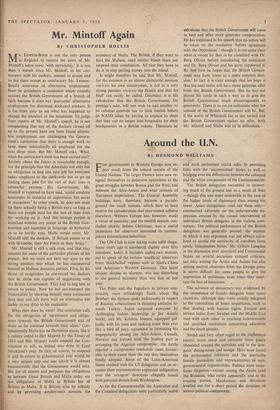Mr. Mintoff Again
By CHRISTOPHER HOLLIS
MR. LENIVOX-BOYD is not the only person in England to receive the news of Mr. Mintoff's latest move 'with incredulity.' It is less than a month since Mr. Mintoff, in his con- troversy with his dockers, seemed to accept and to bid them accept as satisfactory Mr. Lennox- Boyd's assurance of alternative employment. Now he introduces a resolution which roundly accuses the British Government of a breach of faith because it does not 'guarantee' alternative employment for dismissed dockyard workers. It is far from easy to see what has happened to change the situation in the meantime. To judge from reports of Mr. Mintoff's speech, he is not complaining that any of the dockers turned off up to the present have not been found alterna- tive employment nor challenging the Govern- ment's contention that there is enough work to keep them substantially all employed for the next three years. But Mr. Mintoff asks, 'What, when the contractor's work has been carried out?' Anxiety about the future is reasonable enough, but the principle that the Admiralty not only has an obligation to find one new job for everyone today employed in the dockyards but to go on finding them jobs for the rest of their lives is somewhat extreme. His Government, Mr. Mintoff is reported to have said,,`could condone economies in material or supervision but never in manpower.' In other words, he does not insist op there actually being a British navy so long as there are people paid for the rest of their lives for working on it. And this strange protest is launched without any notice to the British Gov- ernment and launched in language so hysterical as to be hardly sane. Malta would resist, Mr. Mintoff told the dockers, 'if Britain comes to us with H-bombs, their Air Force or their Army.'
Mr. 'Mintoff is still a sick man, and that may account for some of the particular phrases of his protest. But we must not shut our eyes to the strong position into which he has manoeuvred himself in Maltese domestic politics. First, by his threat of resignation he convinced the dockers that he alone was, capable of negotiating with the British Government. They had to beg him to return to power. Now he has out-trumped the Nationalists by Showing himself more nationalist than they and, left them with no alternative but feebly to say ditto to his resolution.
What then does he want? The resolution calls for the abrogation of 'agreements and obliga- tions towards the British Government and of those so far assumed towards their allies.' Con- stitutionally Malta has no Dominion status. She is a colony ceded to Her Majesty by the Treaty of 1814 and Her Majesty could suspend the Con- stitution at will, as indeed was done in Lord Strickland's time. In fact, of course, to suspend it and to return to gubernatorial rule would be a very serious step and one which it is almost inconceivable that the Government would take. But for' all intents and purposes the obligations as between Great Britain and Malta today are not obligations of Malta to Britain but of Britain to Malta. It is Britain who by subsidy and by providing employment sustains the economy of Malta. The British, if they want to hurt the Maltese, need neither bomb them nor suspend their constitution. All that they have to do is to stop putting money into the island.
It might therefore be said that Mr. Mintoff, for the moment in an almost dictatorial position vis-a-vis his own countrymen, is not in a very strong position vis-a-vis the British and that his bluff can easily be called, Doubtless it is his calculation that the British Government, for prestige's sake, will not wish to add another to its colonial quarrels nor to look foolish before its NATO allies by having to explain to them that they can no longer find hospitality for their headquarters in a British colony. Therefore he calculates that the British Government will come to heel and offer more generous compensation. He has explained in his speech that no action will be taken on the resolution 'before agreement with the Opposition'—though it is not quite clear what is meant by that as he consulted with Dr. Borg Olivier before introducing the ,resolution and Dr. Borg Olivier and his party supported it. By that time he hopes that the British Govern- ment may have 'come to a more concrete deci- sion.' In fact it is clear enough that his hope is that the next move will be a more generous offer from the British Government. But he has not played his cards in such a way as to give the British Government much encouragement to generosity. There is as yet no indication what the attitude of the British Government will be. But, if the worm of Whitehall has at last turned and the British Government makes no offer, both Mr. Mintoff and Malta will be in difficulties.










































 Previous page
Previous page